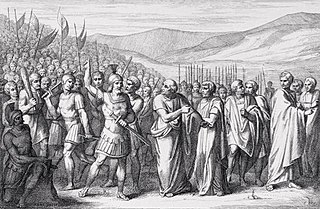Related Research Articles

Publius Valerius Poplicola or Publicola was one of four Roman aristocrats who led the overthrow of the monarchy, and became a Roman consul, the colleague of Lucius Junius Brutus in 509 BC, traditionally considered the first year of the Roman Republic.

Lucius Minucius Esquilinus Augurinus was a Roman politician in the 5th century BC, consul in 458 BC, and decemvir in 450 BC.
Marcus Valerius Volusus was a Roman consul with Publius Postumius Tubertus in 505 BC.

The gens Cloelia, originally Cluilia, and occasionally written Clouilia or Cloulia, was a patrician family at ancient Rome. The gens was prominent throughout the period of the Republic. The first of the Cloelii to hold the consulship was Quintus Cloelius Siculus, in 498 BC.
The gens Verginia or Virginia was a prominent family at ancient Rome, which from an early period was divided into patrician and plebeian branches. The gens was of great antiquity. It frequently filled the highest honors of the state during the early years of the Republic. The first of the family who obtained the consulship was Opiter Verginius Tricostus in 502 BC, the seventh year of the Republic. The plebeian members of the family were also numbered amongst the early tribunes of the people.
Lucius Furius Medullinus, of the patrician gens Furia, was a politician and general of the Roman Republic who was consul twice and Consular Tribune seven times.
Publius Servilius Priscus Structus was a Roman statesman who served as Senator and Consul.
Aulus Verginius Tricostus Caeliomontanus was a Roman Republican politician and general of the gens Verginia. He served as a Roman consul in 494 BC together with Titus Veturius Geminus Cicurinus.
Titus Veturius Geminus Cicurinus was a Roman Republican patrician politician and general of the gens Veturia. He served as a Roman consul in 494 BC together with Aulus Verginius Tricostus Caeliomontanus.
The Roman–Sabine wars were a series of wars during the early expansion of ancient Rome in central Italy against their northern neighbours, the Sabines. It is commonly accepted that the events pre-dating the Roman Republic in 509 BC are semi-legendary in nature.
The Roman-Aequian wars were a series of wars during the early expansion of ancient Rome in central Italy fought against the Aequi, an Italic tribe located to their east.

The first secessio plebis was a significant event in ancient Roman political and social history that occurred between 495 and 493 BC. It involved a dispute between the patrician ruling class and the plebeian underclass, and was one of a number of secessions by the plebs and part of a broader political conflict known as the conflict of the orders.
Gaius Servilius Ahala was a three time consular tribune of the Roman Republic in 408, 407 and 402 BC. He was also magister equitum in 408 BC.
Titus Veturius Geminus Cicurinus was a Roman politician of the 5th century BC, consul in 462 BC and maybe decemvir in 451 BC.
Lucius Lucretius Tricipitinus was a Roman senator in the fifth century BC, and was consul with Titus Veturius Geminus Cicurinus in 462 BC.
Marcus Valerius Maximus Lactuca was a 5th-century BC Roman politician who was a Consul in 456 BC.
Quintus Servilius Priscus Fidenas was a political figure and military leader in the Roman Republic who served as dictator in 435 BC and in 418 BC.
Spurius Nautius Rutilus was a consul of the Roman Republic in 411 and a consular tribune in 419, 416 and 404 BC.
Gaius Valerius Potitus Volusus was a consul in 410 BC and consular tribune in 415, 407 and 404 BC of the Roman Republic.
Manius Aemilius Mamercinus was a three-time consular tribune, in 405, 403 and 401 and also consul in 410 BC, of the Roman Republic.
References
- 1 2 3 Livy, Ab urbe condita , 2.30
- ↑ E. A. Judge (1 January 2008). The First Christians in the Roman World: Augustan and New Testament Essays. Mohr Siebeck. pp. 178–. ISBN 978-3-16-149310-2.
- 1 2 Livy, Ab urbe condita , 2.31
- 1 2 Broughton, vol i, pp.14 (see note 1 for his discussion on the name), 35. Livy, 3.7.6. Dionysius of Halicarnassus 6.39.2
- ↑ Broughton, vol i, pp.9, [note 3, pp.10). Festus, 216 L